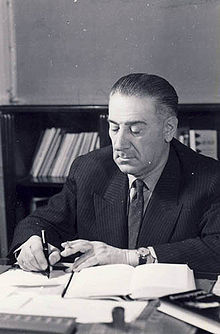Mihai Dumitru Ralea | |
|---|---|
 Ralea at his desk, photographed c. 1960 | |
| Born | May 1, 1896 |
| Died | August 17, 1964 (aged 68) |
| Other names | Mihail Ralea, Michel Raléa, Mihai Rale |
| Academic background | |
| Alma mater | University of Bucharest University of Iași |
| Influences | Henri Bergson, Célestin Bouglé, Émile Durkheim, Friedrich Engels, Paul Fauconnet, Ludwig Gumplowicz, Dimitrie Gusti, Lucien Herr, Garabet Ibrăileanu, Pierre Janet, Jean Jaurès, Ludwig Klages, Vladimir Lenin, Lucien Lévy-Bruhl, André Malraux, Karl Marx, Max Scheler, Werner Sombart, Joseph Stalin |
| Academic work | |
| Era | 20th century |
| School or tradition | |
| Institutions | University of Iași University of Bucharest |
| Main interests | political sociology, sociology of culture, aesthetics, anthropology, social psychology, national psychology, social pedagogy, Marxist sociology, Romanian literature |
| Influenced | Matei Călinescu, Victor Iancu, Adrian Marino, Tatiana Slama-Cazacu, D. I. Suchianu |
| Signature | |
 | |
Mihai Dumitru Ralea (also known as Mihail Ralea, Michel Raléa, or Mihai Rale;[1] May 1, 1896 – August 17, 1964) was a Romanian social scientist, cultural journalist, and political figure. He debuted as an affiliate of Poporanism, the left-wing agrarian movement, which he infused with influences from corporatism and Marxism. A distinguished product of French academia, Ralea rejected traditionalism and welcomed cultural modernization, outlining the program for a secular and democratic "peasant state". Mentored by critic Garabet Ibrăileanu, he objected to the Poporanists' cultural conservatism, prioritizing instead Westernization and Francophilia; however, Ralea also mocked the extremes of modernist literature, from a position which advocated "national specificity". This ideology blended into his scholarly work, with noted contributions to political sociology, the sociology of culture, and social and national psychology. He viewed Romanians as naturally skeptical and easy-going, and was himself perceived as flippant; though he was nominally active in experimental psychology, he questioned its scientific assumptions, and preferred an interdisciplinary system guided by intuition and analogies.
Ralea was a professor at the University of Iași and, from 1938, the University of Bucharest. By 1935, he had become a doctrinaire of the National Peasants' Party, managing Viața Românească review and Dreptatea daily. He had publicized polemics with the far-right circles and fascist Iron Guard, which he denounced as alien to the Romanian ethos; Ralea approximated a Poporanist, leftist, take on Romanian nationalism, which he opposed to both fascism and communism. He later drifted apart from the party's centrist leadership and his own democratic ideology, setting up a Socialist Peasants' Party, then embracing authoritarian politics. He was a founding member and Labor Minister of the dictatorial National Renaissance Front, representing its corporatist left-wing. Seeing himself as a social reformer whose talents had been channelled by the Front, Ralea founded the leisure service Muncă și Voe Bună, and later served as the Front's regional leader in Ținutul Mării. He fell from power in 1940, finding himself harassed by successive fascist regimes, and became a "fellow traveler" of the underground Communist Party.
Ralea willingly cooperated with the communists and the Ploughmen's Front before and after their arrival to power, serving as Minister of Arts, Ambassador to the United States, and vice president of the Great National Assembly. His missions coincided with the inauguration of a Romanian communist regime, whose policies he privately feared and resented. His diplomatic mission, tinged in scandal, was cut short by Foreign Minister Ana Pauker; Securitate operatives regarded him as a suspicious opportunist and contact for the Freemasonry, keeping him under close surveillance upon his return. He was sidelined, then recovered, and, as a Marxist humanist, was one of the regime's leading cultural ambassadors by 1960. Heavily controlled by communist censorship, his work gave scientific credentials to the communist rulers' anti-American propaganda, though Ralea also used his position to protect some of those persecuted by the authorities.
Ralea's final contributions assisted in the re-professionalization of Romanian psychology and education, with the retention of a more liberal, de-Stalinized, communist doctrine. A personal friend of the Communist General Secretary, Gheorghe Gheorghiu-Dej, and to secondary figures such as Ion Gheorghe Maurer, he endorsed the regime's transition into national communism. Always an avid traveler and raconteur, he became completely uninterested in scholarly ventures around the age of sixty. He died abroad, while on mission to the UNESCO, and was posthumously diagnosed with a neurological disease. He endures in cultural memory as a controversial figure: celebrated for his sociological and critical insights, he is also reprehended for his nepotism, his political choices, and his literary compromises. He was survived by two daughters, one of whom was Catinca Ralea, who achieved literary fame as a translator of Western literature.
- ^ Straje, p. 586
© MMXXIII Rich X Search. We shall prevail. All rights reserved. Rich X Search
